Stomping Out Sexual Harassment in the Workplace
A new sexual harassment legislation is seeking to hold employers accountable, to ensure that there is a zero-tolerance policy in workplaces across the country. The Anti-Sexual Harassment Act was recently debated and passed through the National Assembly with support from both sides of the aisle. It places significant emphasis on the workplace where sexual harassment may lead to a hostile working environment. In some cases, individuals engage in unwelcome sexual advances as a form of quid pro quo. Research shows that women are the most common targets of sexual harassment in the workplace. The Anti-Sexual Harassment Act mandates that employers must establish a sexual harassment policy and take immediate action when they become aware of a reported incident, among other requirements. In this week’s installment of the Five Point Break Down, News Five’s Paul Lopez takes a closer look at the legislation and how it stands to impact the workplace. Here is that report.
The Anti-Sexual Harassment Act
Paul Lopez, Reporting
The Government of Belize is making its position on sexual harassment in the workplace explicit with its Anti-Sexual Harassment Act. The drafting of the legislation was spearheaded by the Ministry of Human Development, headed by Minister Dolores Balderamos-Garcia.

Dolores Balderamos-Garcia
Dolores Balderamos-Garcia, Minister of Human Development.
“So basically now we are putting a serious onus on the workplace and the employers who control that workplace to ensure there is little sexual harassment as possible. Section sixteen of the act says if the employer is aware and knows that there is sexual harassment taking place, he or she has a responsibility to mediate, to let it be known and to take action. Then at that point if you have full awareness abo0ut it and do nothing there can be liability. We need to send the strong message that there must zero tolerance of sexual harassment. We hear reports within government, within organizations, within the private sector, it is real. It is real, sexual harassment is real and we have to send the strongest of message and messages that there needs to be accountability.”
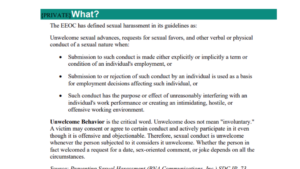 What is Sexual Harassment?
What is Sexual Harassment?
The United Nations defines sexual harassment as unwelcome verbal or physical sexual advances, and request for sexual favors, especially when used as a term or condition for an individual’s employment. The Anti-Sexual Harassment Act places significant emphasis on the workplace.
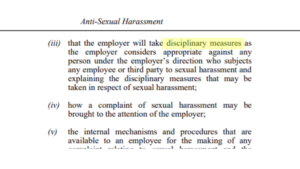 Sexual Harassment in the Workplace
Sexual Harassment in the Workplace
The Anti-Sexual Harassment legislation stipulates that an employer must make every reasonable effort to ensure that his or her employees are not sexually harassed in the course of their employment. One of the ways this is to be done is through the issuance of a policy statement in writing on prevention of sexual harassment. Employers must also ensure that they take the necessary steps to bring this policy statement to the attention of all employees. Employers and institutions are being afforded twelve months from the time the legislation is enacted to have such a policy in place.
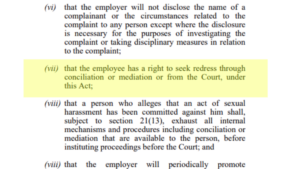 Dolores Balderamos-Garcia
Dolores Balderamos-Garcia
“We are saying that businesses must have an anti-sexual harassment policy and the policy should be in writing, especially again for the bigger places. Again, not the big organizations, but your organizations that have many employees. The organization that has the most employees in the country is the Government of Belize, we have a huge amount of government workers. So government and ministries will have to have their written policy and to promulgate it and make sure people know about it so that we send a strong message.”
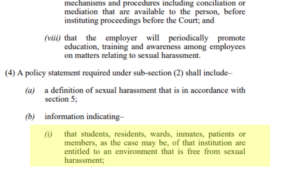 The Anti-Sexual Harassment Debate
The Anti-Sexual Harassment Debate
A blueprint of the anti-sexual harassment policy required in every organization is outlined within the act. The policy must speak to how an employer will deal with sexual harassment reports, disciplinary actions, the internal mechanisms to make such a complaint and guidelines for confidentiality. The policy must also clearly state that the employee has a right to seek redress through conciliation or from the court. The bill was recently debated in the National Assembly with full support from its members.
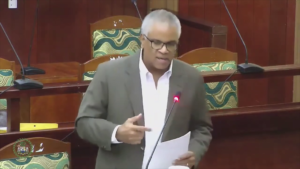
Eamon Courtenay
Eamon Courtenay, Lead Senator for Government Business
“It is a critically important bill in a society like our, indeed in any society, but in our society, and it is mostly males there is sexual harassment.”
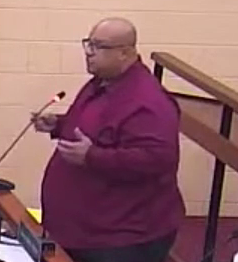
Michael Peyrefitte
Michael Peyrefitte, Lead Opposition Senator
“While people do get sexually harassed, once you are hit with that stigma and accused with that, whether true or not, that is with you for life. So it is also a serious thing to accuse somebody of it. It should be made aware that there are penalties for making false accusations and the like.”
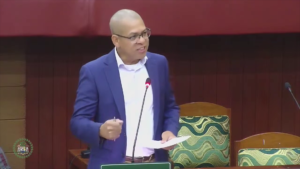
Kevin Herrera
Kevin Herrera, Business Senator
“There has to be an intolerance to this type of thing. And so, when it is identified, companies and organizations have a responsibility to act and ensure that they address that situation immediately,. That is an extremely goof thing because for far too long persons have suffered the indignities of harassment in many forms in this country.”
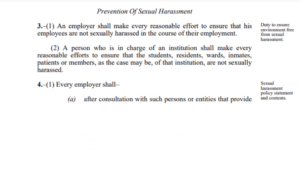 A Comprehensive Approach to Anti-Sexual Harassment
A Comprehensive Approach to Anti-Sexual Harassment
Minister Garcia explained that before the legislation is enacted, a period of two weeks is being given for further comments and recommendations. And, while the Anti-Sexual Harassment Bill places emphasis on the workplace, it also focuses on stomping out sexual harassment in institutions such as schools, detention facilities and hospitals. There are also provisions that speak to landlords and their tenants. The legislation is described as comprehensive and far reaching.
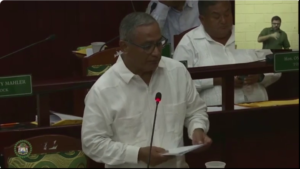
Prime Minister John Briceño
Prime Minister John Briceño
“Sexual harassment is mostly against women, but men are also sexual harassed. We have to take that into consideration. This is something that protects everybody, both men, women, at home, in the workplace, public, wherever it is. In school, where a lot of time we get complaints from parents about the harassment of their children, mostly daughters, but children in general. We had a long discussion about this in Cabinet so it is not something we are passing just for passing. We have to make sure we cover all the bases and that it is something that can work in Belize, in the workplace, in schools, to ensure we can give the protection our citizens need against sexual harassment.”
Reporting for News Five, I am Paul Lopez.







Facebook Comments